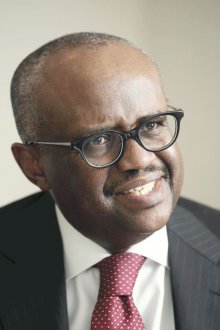
Ambassador Solomon Maina speaks during an interview
A major global platform to support Africa’s development, the Tokyo International Conference on African Development, will be held in Nairobi on Aug. 27 and 28, the first such event to take place in Africa. Kenyan Ambassador Solomon Maina, who represents the host country, spoke about the meaning of having TICAD in Africa and key aspects of this year’s conference. As a career diplomat stationed in Japan, he also discussed challenges that Japanese society is facing.
Q: Later in August, TICAD will be held in Nairobi. How would you describe the significance of holding TICAD in Africa?
Solomon Maina: TICAD coming to Africa certainly is a major milestone achievement. Considering the existence of TICAD over the last 23 years, all the five previous summits have been held here in Japan. So it was decided that Africa has to be the venue of TICAD VI.
TICAD coming to Africa certainly is a clear recognition that Africa has come of age in a mutual, profitable partnership with Japan. It will give our African brothers and sisters, men and women, ordinary citizens, the opportunity to realize that sense of ownership of TICAD and appreciate its contributions to Africa’s growth and development. And finally, this will be the first time that the private sector is being given the opportunity to weigh in on Africa’s development. It’s high time that the private sector joins to engage in Africa’s industrialization and economic growth.
The conference cannot only focus on aid-based assistance. We’re currently moving away from ODA [official development assistance] aspects and toward trading, hence the importance of the private sector. The private sector needs to have a strong foothold in the TICAD process.
Q: What is the expected result of the TICAD VI conference?
A: We are expecting TICAD VI to come out with very important resolutions. We have to remember that during the last TICAD in Yokohama, the leaders decided to shorten the period between the sessions. Henceforth, TICAD will be held every three years. Now, the Yokohama action plan, which is based on six pillars, that is still ongoing. The pillars — which are focused on boosting economic growth; accelerating infrastructure and capacity development; empowering farmers; promoting sustainable and resilient growth; creating an inclusive society; and finally looking at the issues of consolidating peace, stability, democracy and good governance — they’re all being implemented.
Now, as you are aware, the world has changed since TICAD V.


